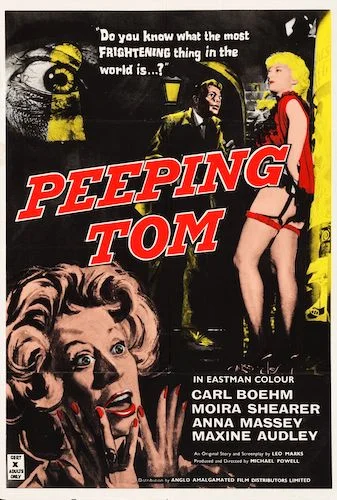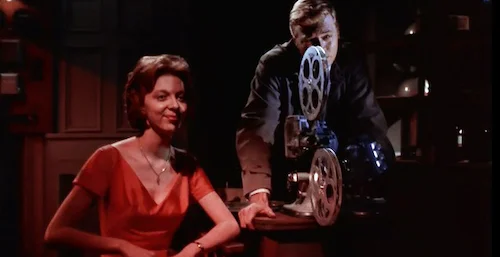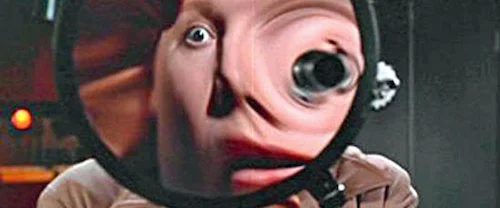Peeping Tom: On-This-Day Thursday
Every Thursday, an older film released on this opening weekend years ago will be reviewed. They can be classics, or simply popular films that happened to be released to the world on the same date.
For May 16th, we are going to have a look at Peeping Tom.
How does time change the value of a medium? Were we too far behind a film? Was the film too far ahead? Peeping Tom was more than chastised when it first came out. It was reviled. It was repulsed. Alfred Hitchcock's Psycho went a few steps ahead of the curve and made audiences uncomfortable. It was still well received, though. Peeping Tom was spat on.It went too far. This is the kind of film that gets celebrated nowadays. Nicolas Winding Refn and Gaspar Noé can put out artistically strong taboo-fests, and people acknowledge these works as being very of their natures.
Perhaps this film was not seen as part of Michael Powell's nature, but I consider that an oversight. His partnership with producer Emeric Pressburger (the duo were known as The Archers) created many spectacular films; look closer, and the darkness was always there. Even in the breathtaking musical The Red Shoes, we experience a highly morbid end. Even without that conclusion, we have a ballet dancer forced to keep going against her will. It's a fairy tale, but it's a harsh reality in the entertainment industry. You perform when you are told to.
You can analyze any of the main films by the Archers. You can look at their under admired gems, too. You will just get the same result. Powell and Pressburger loved to lead the pack in Britain's film industry through rich colours, glorious angles, and spellbinding scripts. They also liked to make meta commentary on varying industries, particularly film.
An early interaction between Mark and Helen.
Enter Peeping Tom: an artistic horror where a Bolex-yielding photographer murders women while recording them, and then views the results in his darkroom later on. Powell worked alone here, but it's as if he pounced on the opportunity knowing Pressburger wouldn't go down if the ship were to sink. Whereas a film like The Red Shoes somewhat dabbled with mortality and self referential commentary, Peeping Tom went all in. It virtually did not care: not about the Hollywood Code, audiences, or how film may be perceived afterwards. Maybe that's why people hated it. It exposed them to something film was, and what it could be.
So, what is Hollywood according to Peeping Tom? It can be an objectification. Mark has to photograph women on a daily basis, and he is guided by his boss's orders to follow the way pornographic magazines present women. You see issues on a stand early in the film. Women are not powerless, but Peeping Tom exposes how they can be framed to look that way. This is shown with Mark's killing tactics, too. He follows women around with his camera, and his viewer reveals a crosshair: his focal points are his prey.
What is especially bizarre is how Powell injects himself into Mike: why would a filmmaker want to be linked with the leading murderer of his own film? A scene where Mike is forcing Helen to watch some uneasy films during her birthday is an example of Powell making his own statements. Helen asks many questions throughout the film, as if she shouldn't be watching this footage at all (or it at least doesn't make sense as to why she should watch these films). Mike responds coldly but honestly, as if all of this should make sense. This is Powell. This is him having to answer the masses day in and day out for decades. Now, he was going to give them a film they would have many questions about.
Mark views his subjects through what looks like a sniper scope, despite it just being his camera.
Well, he got a response all right. It's too bad, because Peeping Tom is clearly a well made film. Every image is drenched in gel lights (some of the finest technicolor images ever, which was common for Powell). Tight angles with precise framing. Calculated music that mimicked silent era pianos, thriller suspense, and even a racing heartbeat. Maybe it's easy to insist it should have been reconsidered when it was released, because it is so easy to see how advanced the film was. Notice how the film feels like it could have been made in 1970 and not 1960.
The camera and its operator are the villain of Peeping Tom: a voyeur that depicts reality in a skewed way. This reality being turned into a sick perversion is almost like an artistic statement. "Whatever I photograph, I always lose," Mark says quivering in a latter scene.
Helen during the twisted, heart racing climax.
These are the words of a psychopath, but they may be those of a perfectionist like Powell, too. Performers and models are forced to do the bidding of the photographer. This is the grizzly result when a profession gets turned into an obsession. It may have been a tough pill to swallow back in 1960. Now, Powell's best work as a solo director is so much more. It's a prognosticator for the slasher genre and the aesthetic horror. It is a metaphor for the very industry it worked through to be made. Luckily, Powell lived long enough to see the change of heart the world had with Peeping Tom: his most candid, distraught, and disturbing vulnerabilities and reservations of his favourite art-form were not in vein after all.
Andreas Babiolakis has a Masters degree in Film and Photography Preservation and Collections management from Ryerson University, as well as a Bachelors degree in Cinema Studies from York University. His favourite times of year are the Criterion Collection flash sales and the annual Toronto International Film Festival.








